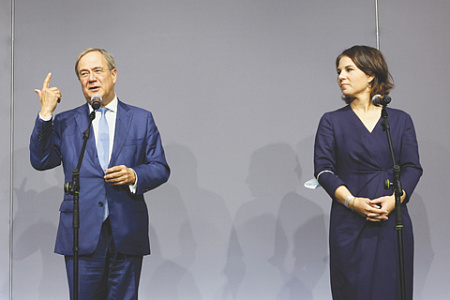
On Tuesday, March 25, the newly elected Bundestag will meet in Berlin for its first meeting. But there is still a long way to go before the new federal government is approved. By March 31, 16 working groups created by representatives of the conservative bloc of the Christian Democratic and Christian Social Unions (CDU/CSU) and the Social Democratic Party of Germany (SPD) to develop a coalition agreement must submit to the party leadership the already agreed government program.
According to media reports, the most significant disagreements are observed within the working groups “Migration”, “Finance” and “Labor”. In the first group, they deal with the issues of detaining illegal migrants right at the German border and expelling them back. In the second group, the dispute is about taxes, and in the third – about the amount of social benefits and the persons for whom they should be available.
The other day, CDU leader Friedrich Merz proposed depriving Ukrainian migrants who refuse the job they are offered of social benefits. And this affects more than 1 million people. The fact is that, despite the extra-budgetary fund already approved by both the Bundestag and the Bundesrat (Chamber of Lands), its funds, as it turned out, are still not enough to solve all the problems. After all, a significant part will be spent on military spending and assistance to Ukraine.
In fact, Merz’s trust is at stake. During the election campaign, he spoke out against debt, for tougher migration policy, for reducing the tax burden on industry and the middle strata of the population, and for reducing social spending. Now, for the sake of the chancellorship, he is forced to make concessions to the SPD and even the Greens. The 100 billion euros promised to the Greens from an extra-budgetary fund for their environmental programs in exchange for support for constitutional change bring little to the German industry.
The program to achieve climate neutrality in Germany by 2045 is actually hanging in the air, as the EU plans this step only by 2050. And the rest of the world is gradually moving away from climate euphoria after the Donald Trump administration came to power in the United States. To combat the warming of the planet, events in a single country do little in practical terms. They only allow the “Greens” to stay afloat.
Given the current situation, the German media claim that voters voted for moderate conservatives, and as a result, they get a government of moderate leftists. It is no coincidence that the current Chancellor Olaf Scholz predicted victory in the last election for the SPD. So far, the ideas of the Social Democrats are being implemented in the programs of the Christian Democrat Merz, who really wants to become chancellor. But without the SPD, and as it turned out, without concessions to the Greens, he cannot do this.
On March 25, by 5 p.m. Berlin time, all the working groups will present their projects to the deputies. In them, the differences will be highlighted in color: the ideas of the SPD in red, and the ideas of the CDU and CSU in blue. On Wednesday and Thursday, these projects will be discussed at faction meetings and on party boards. Then the so-called management group comes on the scene, which will include one representative from each party, and it will try to reach compromises. This group is assigned to work on Friday and Saturday.
The final version of the government program must be approved by the congresses of the parties participating in the coalition. Merz himself has stated that he hopes to settle all differences by Easter and finally become chancellor by the end of April. But the journalists of the Second Channel of German TV doubt that such a plan will be able to survive.
In parallel with the disputes about the program of the future government, the candidates of key ministers are being discussed behind closed doors. The newspapers drew attention to the fact that German Foreign Minister Annalena Burbock, who went on a trip to the Middle East in connection with the latest escalation of the situation in the Gaza Strip, was accompanied by Christian Democrat Armin Laschet. Hence, it was suggested that Burbock, who is currently applying for the presidency of the next session of the UN General Assembly, decided to bring the future German Foreign Minister up to date on matters related to the Middle East.
Recall that Laschet was a candidate for chancellor from the CDU/CSU bloc in the previous elections. He was defeated, most likely due to chance, when he smiled unnecessarily when visiting a flooded region, which was recorded by television cameras.
